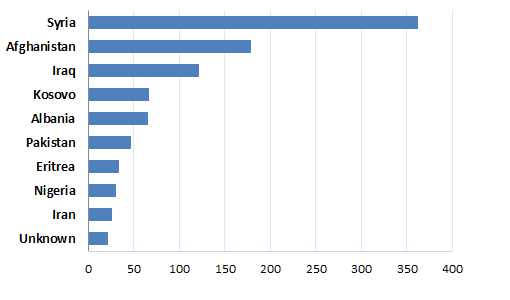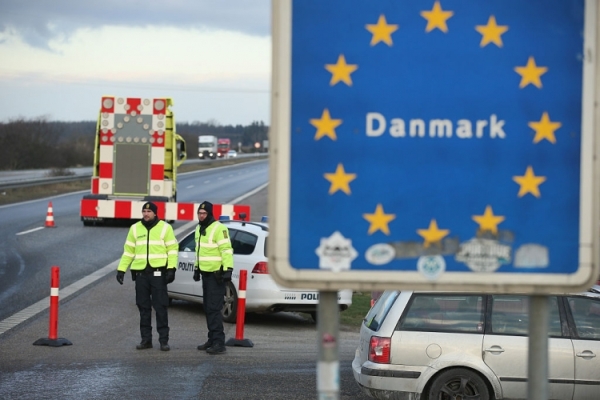Last year, Europe saw an upsurge in the number of refugees entering its shores resulting in a migration crisis which is threatening the existence of European Union (EU). Frontex, the EU border agency, recorded 1.8 million detections of illegal entries associated with an estimated one million individuals.
This exponential rise in migrants to Europe was mainly fuelled by the refugee crisis created by the ongoing war in Syria. As a result, Syrians made up the bulk of these migrants outnumbering by far the second biggest nationals namely Afghans.

The humanitarian crisis
Therefore, it is no surprise that with significant increase in migrants in such a short period of time; unforeseen and sometimes tragic circumstances were going to occur. First, a great deal of human misery and deaths has taken place as a result.
Such an onslaught of humanity fleeing from their native homes, coupled with unscrupulous human traffickers preying on their desires for a better life in Europe, have resulted in more than 3,700 people dying while trying to cross the Mediterranean sea into Europe.
Thousands more have endured the misery and deprivation involved with such a long trek away from their native lands in search of safety.

Of the more than 1.3 million official asylum applications filed by these refugees in 2015, the largest number, over 500,000 were for asylum in Germany.
France, Hungary, Italy, Sweden and Austria also had applications numbering over 100,000 each. When the number of asylum applicants is viewed through the metric of native population density, Hungary, Sweden and Austria are the most affected.
Each of those three countries had over 1,000 asylum seekers applying in their countries for every 100,000 of their own population.
It has been suggested that the reason these countries have been disproportionately selected by migrants as their destination is due to their preferential social welfare programs and established Middle Eastern communities.
The problem was exacerbated by German Chancellor Angela Merkel, citing Germany’s humanitarian asylum laws, extended what some call an “open arms” policy to the refugees.
Whether this was inspired by a more fundamental economic reason, such as bolstering Germany’s labour base, or purely for humanitarian reasons, Merkel received a severe backlash from within Germany and throughout Europe as this seemed to coincide with an ever increasing wave of refugees pouring into Europe.
Schengen agreement demise
Hungary, Croatia and even Austria were compelled to apply stricter border crossing enforcements to stem the influx of asylum seekers trying to make their way into Germany. These same countries constructed walls and barriers using razor wire. Sweden and Denmark introduced border controls as well.

All of this was counter to the stipulations of the Schengen agreement, which for the exception of the United Kingdom and Ireland, had virtually eliminated border controls between the EU member states.
Prior to the refugee crisis that started in 2015, the European Union was already under tremendous pressure dealing with the effects of the 2008 Eurozone crisis, and more recently with the Greek sovereign-debt crisis.
Domestic pressures were already building within the economically stronger member countries, with their populations growing increasingly discontent with financial rescue packages being sent to bail out the less fiscally sound members, such as Greece.
The refugee crisis was simply another drop in a bucket of discontent that had already begun to foster nationalistic and fiscally conservative movements in many member nations of the EU. One of the best examples of this type of movement can be seen in the United Kingdom Independence party, commonly referred to a UKIP.
Founded in 1991, by 2009, with the effects of the 2008 economic crisis in full bloom and an increasing public perception that traditional political parties had foregone their responsibilities to the local working-class, UKIP began to rise in influence. It eventually started winning in local elections as well as in the 2014 European election.
In 2015, UKIP even won a seat in the House of Commons. UKIP is one of the most vocal advocates for the United Kingdom to leave the European Union. This is commonly known as the Brexit.
On the 23rd June 2016, there will be a nationwide referendum on whether or not the UK should leave the EU.
Brexit
A UK departure would be significant, although likely not immediately fatal to the European Union. Being a member of the political union, while not a member of the monetary union would help mitigate some of the impact of a UK exit.

It would, however, establish a precedent for other disenchanted member nations to start on the same path.
Social and political movements in the Netherlands, Poland and Denmark already demonstrate a huge fervour from the local population to exert a greater degree of autonomy in their governance. They are striking back at the perceived over reaches of the EU. This is especially true in matters of immigration and economic policy.
The social anxiety that exists in many EU countries today is easily brought to frenzied levels. Situations as the increasing numbers in rapes and sexual assault on European women by males that entered as refugees, or the cases of Islamic extremists engaging in acts of terrorism on European soil, have created a condition ripe for domestic discontent.
The idealised image of the EU as a beacon for unity and modernity seems to have been replaced by a view that it is cumbersome and an impediment to the best interests of each member nation.
2016 will mark the 24th anniversary of the signing of the Maastricht Treaty, the document that formalised the creation of the EU. Will the EU live to see its 25th anniversary? The probability is quite high that it will, even though by then some profound changes may be evident. Whether it survives to see its 30th, 40th or 50th anniversary? That is perhaps less likely.
While it would be prudent for there to always be some sort of economic alliance, or trading block, between the major European nations – the growing discontent seen in the last eight years coupled with the intense reactions to the refugee crisis are indicative that the number of tomorrows for the EU are numbered.






